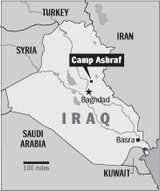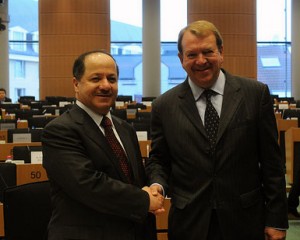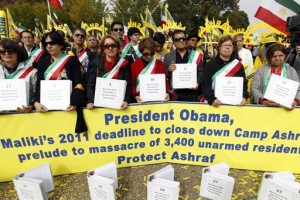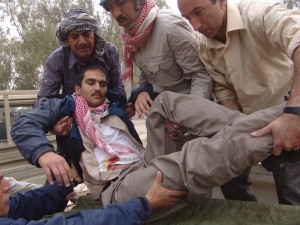THE INDEPENDENT
Who remembers the siege of Sarajevo? Today’s world leaders might have forgotten the early 1990s and the four-year encirclement of the capital of Bosnia and Herzegovina by Serbian forces.
Known as one of the longest sieges in modern warfare, it was also a bloodbath – thousands of lives were lost, many of them women and children. For Europe, Sarajevo was a humiliation because the massacre occurred at the heart of what some claimed was the most civilised continent on earth. The European Community was incapable of coming together to prevent the extermination of innocent Europeans.
A new Sarajevo is in the making today, and the question must be asked again: will the European Union stand by and watch? At Camp Ashraf in Iraq, 3,400 residents are encircled. Loud speakers have been placed around the town’s perimeter as part of a campaign of psychological intimidation. They blast out insults and threats in the early hours of the morning. The aggressors, Iraqi forces, are taking orders from the Iranian regime. They want Camp Ashraf cleared out and shut down because the residents are members of the People’s Mojahedin Organization of Iran (PMOI), the main Iranian opposition group.
No-one is allowed out of the Camp to receive medical attention. Foreign observers, including Euro MPs, US congressmen and journalists, are not allowed to enter. In the latest sign that the siege is tightening, Ashraf’s fuel supplies have been cut off. There have been no gasoline deliveries for almost a year, and very little diesel fuel and kerosene. Now that temperatures are dropping, Iraqi prime minister Nouri al-Maliki has ordered an end to deliveries of coal and wood.
Discomfort is sadly not the only hardship Camp Ashraf has had to endure. In April this year Iraqi troops stormed the town and opened fire on anyone who tried to resist. Some 36 residents died, including eight women. More than 300 were wounded. “What happened on the 8th of April is deplorable,” European Union High Representative Catherine Ashton told the European Parliament. “We need a strong united EU response,” she said. Iraq “has a duty to protect the human rights of Ashraf residents”.
The EU has increased diplomatic pressure on the Iraqi regime in recent months. Some 180 Euro MPs signed a joint declaration in October warning that “the lives of 3,400 Iranian dissidents, including 1000 women, in Camp Ashraf, Iraq are in danger.” If Iraq was allowed to impose its December 31 closure deadline there could be a “large-scale massacre”, they warned. The precedents are not good. Another nine residents were killed in a separate attack in 2009. Dozens have been held and tortured.
The EU prides itself on its common, shared values, such as opposition to the death penalty. It actively exports these values to other nations. If Europe is serious in its desire to become a heavy-hitting diplomatic force it must show determination and oblige the Iraqi Government to abandon its year-end deadline. Europe must also respond to calls for Ashraf residents to be treated as asylum-seekers and resettled in countries where their lives are no longer at risk.
Europe is to a large extent in the driving seat. The US promised to protect Ashraf residents, but this promise did nothing to prevent the killings. And US troops are withdrawing from Iraq at the end of the year. What new atrocities can we expect when they are gone?
EU should weigh on the government of Iraq to revoke the deadline and UN monitors should be placed there so the United National High Commission for Refugees could do its work and be able to transfer the residents to third countries.
Camp Ashraf is of course a small piece in a much larger geopolitical puzzle. Tension between Iran, the US and its allies over Iran’s nuclear weapons programme is rising once again. But Europe must not lose sight of the fact that this is essentially a humanitarian crisis. Camp Ashraf is caught in the crossfire. Its inhabitants made their homes there 25 years ago. Europe has the opportunity to prevent a bloodbath. This must not go down in the history books as the Sarajevo of the Middle East.
http://blogs.independent.co.uk/2011/11/15/sarajavo-style-siege-at-refugee-camp-in-iraq/



